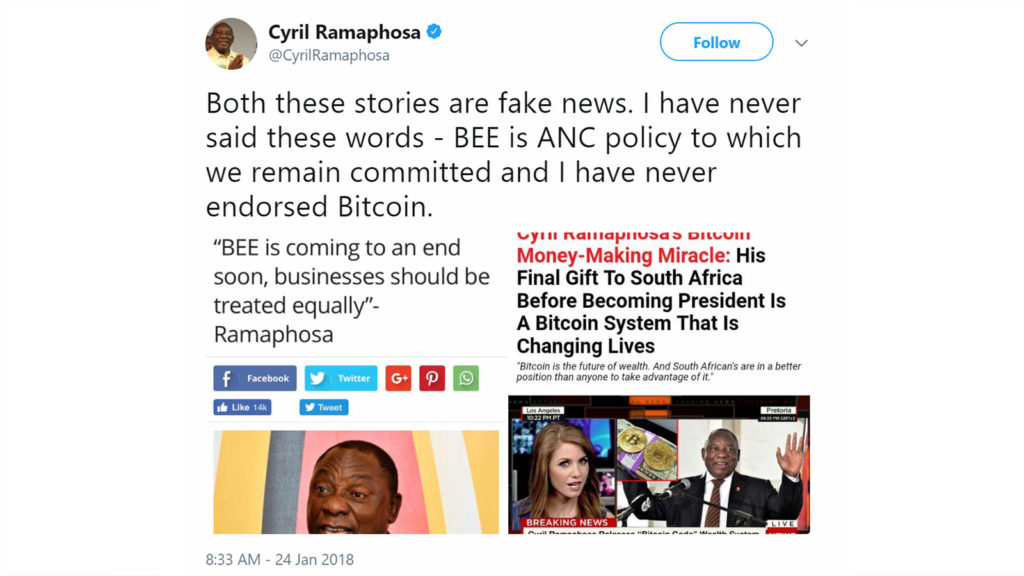Anthropic says its AI will not be used to spy on customers, even in government contracts. Here is what that means for AI governance, enterprise trust and defence partnerships.
Fake news catches Helen Zille, Cyril Ramaphosa off guard

During the 2016 US presidential election, “fake news” was a hot topic. Articles about Hillary Clinton declaring Sharia law permeated the web, as did the likes of one that claimed Donald Trump had called Republicans the “dumbest group of voters”.
These stories were largely coming from places like Macedonia — where companies (known as “troll factories”) were earning massive ad revenue — and Russia, where it’s alleged the Kremlin had a part to play in the election’s outcome.
But just because these motives were rooted in the US, as well as its potential for clicks, doesn’t mean other countries aren’t susceptible to the same potentially malicious chance-takers.
ANC President Cyril Ramaphosa and Western Cape Premier Helen Zille fell victim to fake news from both sides
This week, ANC President Cyril Ramaphosa and Western Cape Premier Helen Zille were made keenly aware of this fact, falling victim to “fake news” from both sides. Ramaphosa was the target of the false reports, Zille was forced to apologise for spreading it.
Yesterday, Ramaphosa tweeted that two different stories — one about ending BEE, and another about Bitcoin — were untrue.
Both these stories are fake news. I have never said these words – BEE is ANC policy to which we remain committed and I have never endorsed Bitcoin. pic.twitter.com/vAwwouEYll
— Cyril Ramaphosa (@CyrilRamaphosa) January 24, 2018
The first story entitled “BEE is coming to an end soon, businesses should be treated equally” was posted by Gossip Mill Mzansi, a site that posts entirely made up stories about South African politicians. All articles are written by the fictional “Jade Wilsons”.
The other was from a less sophisticated site news-24-now.com, whose homepage was made up to look like an article from News24. This form of fake news isn’t uncommon: In October 2016, TimesLive took a site called “T1meslive” to the South African Institute of Intellectual Property Law for luring in unsuspecting readers who trusted TimesLive.
News-24-now does the same, and in doing so brings in ad revenue from a full page ad that pops up despite the use of an ad blocker. It also promotes a software called BitCoin Code, a scam that asks for users’ credit card information.
Sites like Gossip Mill Mzansi and News-24-Now are specifically targeting South Africans
The site very specifically targets South Africans, and the fake comment section uses names like “Jabulani Gumede” and “Chanelle Koetze” to reassure readers that “yes [BitCoin Code] works”.
“My god south africa! After the kak we’ve been through with zuma this is exactly what we need and deserve,” reads a comment from “Oliver Wright”.
But while Cyril Ramaphosa was debunking the news, Helen Zille was unwittingly spreading it.
I have been informed that the Ayanda Dlodlo tweet is a fake. I apologise. I received it by WhatsApp from a usually reliable source, but it turns to have been a fraud. That in itself is incomprehensible at a time like this.
— Helen Zille (@helenzille) January 23, 2018
The Western Cape Premier had to issue an apology after tweeting about a story that claimed Minister of Home Affairs Ayanda Dlodlo said that “South Africans living in other countries like Cape Town must come back home in order for us to be able to help them”.
This story came from Gossip Mill Mzansi too, but it could also be found on a site called South Africa Uncut, its near-exact replica. The sites use the same template and post the same articles — only South Africa Uncut avoids the use of bylines, and articles are instead said to be written by “admin” instead of “Jade Wilsons”.
The Cape Town article became so widespread that the Department of Home Affairs issued a statement declaring it untrue.
A Google search shows that Gossip Mill’s about page was created nearly two years ago
The worst part? None of this is new. A Google search shows that Gossip Mill’s about page was created on 26 April 2016. The Daily Maverick wrote about it and others in January 2017. And yet, here we are, January 2018, and the sites are not only still operational, but influencing South Africa and its politicians.
According to the South African government, there is recourse for sites like these. The Internet Service Providers Association (ISPA) has a mandate to remove fake news from the web, and it has since 2002. But still, Gossip Mill thrives.
The ISPA has been reached for comment.
